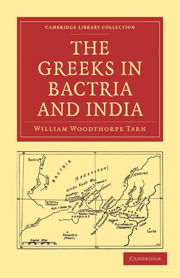Book contents
- Frontmatter
- Contents
- Prefaces
- Abbreviations
- Introduction
- PART I (INTRODUCTORY): THE BACKGROUND IN THE MIDDLE EAST
- PART II BACTRIA AND INDIA
- CONCLUSION
- Excursus. The Milindapañha and Pseudo-Aristeas
- Appendix 1 Monograms and find-spots
- Appendix 2 The names in -ηνη
- Appendix 3 Agathocles' pedigree coins
- Appendix 4 The Yuga-purāna of the Gārgī Samhitā
- Appendix 5 Demetrius in the Hāthigumphā inscription of Khāravela
- Appendix 6 Alexandria of the Caucasus and Kapisa
- Appendix 7 Antiochus IV and the temple of Nanaia
- Appendix 8 A sealing from Seleuceia
- Appendix 9 Ki-pin (Kophen) and ‘Arachosia’
- Appendix 10 Ta-yuan
- Appendix 11 Chorasmia
- Appendix 12 Ormuz: a lost kingdom
- Appendix 13 Σάγαλα ἡ καὶ Εὐθυμέδεια
- Appendix 14 The supposed Oxo-Caspian trade route
- Appendix 15 The Oxus question to-day
- Appendix 16 The Era of the Moga copperplate from Taxila
- Appendix 17 The Hermaeus-Kujula Kadphises coins
- Appendix 18 San and Rho
- Appendix 19 Pāndava-Pāndu and Pāndhya
- Appendix 20 The Chinese sources
- Appendix 21 The Greek names of the Tochari
- Addenda
- Addenda (1950) to the Second Edition
- General Index
- Index of Principal Greek and Latin Passages
- Plate section
- Frontmatter
- Contents
- Prefaces
- Abbreviations
- Introduction
- PART I (INTRODUCTORY): THE BACKGROUND IN THE MIDDLE EAST
- PART II BACTRIA AND INDIA
- CONCLUSION
- Excursus. The Milindapañha and Pseudo-Aristeas
- Appendix 1 Monograms and find-spots
- Appendix 2 The names in -ηνη
- Appendix 3 Agathocles' pedigree coins
- Appendix 4 The Yuga-purāna of the Gārgī Samhitā
- Appendix 5 Demetrius in the Hāthigumphā inscription of Khāravela
- Appendix 6 Alexandria of the Caucasus and Kapisa
- Appendix 7 Antiochus IV and the temple of Nanaia
- Appendix 8 A sealing from Seleuceia
- Appendix 9 Ki-pin (Kophen) and ‘Arachosia’
- Appendix 10 Ta-yuan
- Appendix 11 Chorasmia
- Appendix 12 Ormuz: a lost kingdom
- Appendix 13 Σάγαλα ἡ καὶ Εὐθυμέδεια
- Appendix 14 The supposed Oxo-Caspian trade route
- Appendix 15 The Oxus question to-day
- Appendix 16 The Era of the Moga copperplate from Taxila
- Appendix 17 The Hermaeus-Kujula Kadphises coins
- Appendix 18 San and Rho
- Appendix 19 Pāndava-Pāndu and Pāndhya
- Appendix 20 The Chinese sources
- Appendix 21 The Greek names of the Tochari
- Addenda
- Addenda (1950) to the Second Edition
- General Index
- Index of Principal Greek and Latin Passages
- Plate section
Summary
Much was lost to the history of Hellenism when the Greek accounts of their empire in Bactria and India which once existed were allowed to perish. The story of the Greeks in the Farther East is notable in two aspects, first as the history of a march state and secondly as a unique chapter in the dealings of Greeks with the peoples of Asia; and to omit the Euthydemid dynasty from Hellenistic history, as has usually been done, and to confine that history to the four dynasties which bordered on the Mediterranean—one of which, the Attalids, was of very secondary importance—throws that history at least out of balance. A few words may be said by way of conclusion about these two aspects of the Graeco-Bactrian empire.
Professor Toynbee in his great work has dealt once for all with the characteristics of the march state at large and has given many instances of how such a state, under the stimulus of external pressure, might be expected to develop such strength that it would not only master the pressure but would have plenty of energy over for other purposes. It might perhaps be said that in the Greek world Macedonia had been such a state: exposed to barbarian pressure from the North and to the pressure of Olynthus and Athens from the side of the sea, the little country developed such amazing vitality that it not only mastered both pressures and for two centuries shielded Greece from the barbarism of the Balkans but was able also to conquer the great empire of Persia.
- Type
- Chapter
- Information
- The Greeks in Bactria and India , pp. 409 - 413Publisher: Cambridge University PressPrint publication year: 2010First published in: 1938



